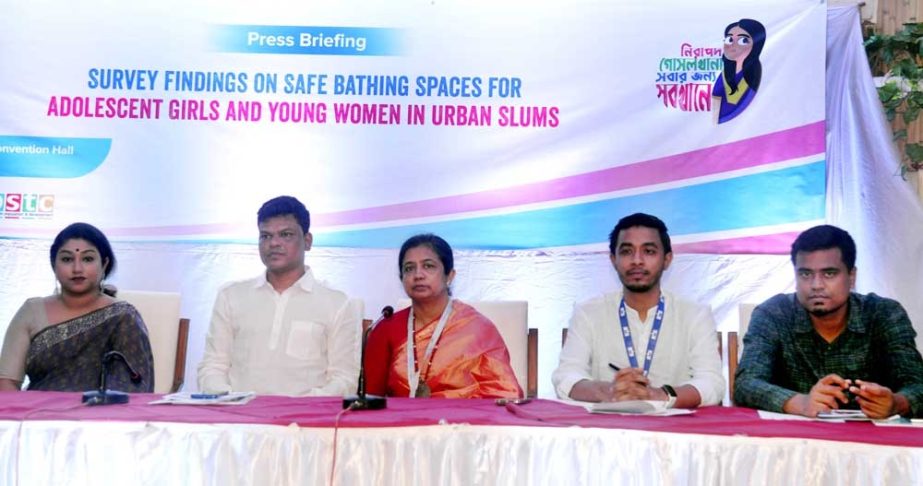
City Desk :
Adolescent girls and young women of urban slum areas feel unsafe while bathing at open bathing spaces. Lack of accessible water, infrastructural challenges cause risk of sexual harassment and violence, says a recent survey result. International development organisation Plan International shared the survey findings during a press briefing on Saturday, 11 June at a convention centre in Dhaka. S M Tariquzzaman, WASH Specialist of Plan International Bangladesh, shared the survey findings in the event. He said, Plan International Bangladesh started a model project titled “Empowering Girls for Economic Opportunity and Safe Space-Egloss” since January 2022. Under this project, the organisation initiated to establish and reform 15 bathing spaces in 4 slum areas of Dhaka: Dhalpur, Malek Member Colony, IG Gate Colony, and Match Colony.
The initiative has been implemented by Plan International Bangladesh and Population Services and Training Centre (PSTC). Under this initiative, we have also conducted a survey in these four slum areas where 417 girls under the age range of 14-24 years took part. 12 focused group discussion was also organised. The survey was conducted by youth-led organisation BYS with the support of Plan International Bangladesh.In the survey, 98& respondents shared that the use open bathing spaces for taking their everyday shower. Among these open bathing spaces, only 15% have separate zone for girls where women commonly share the place for shower.
According to the survey, on an average, per bathing space is shared by 35-45 people, maximum user is 70 while minimum is 20. The respondents said during the focused group discussions that, they do not feel safe in these bathing spaces. There are risks of taking photos from high-raised buildings around the colonies. 68.6 percent said, they face violence at different times during using toilet.
There is lack of menstrual hygiene management facilities in these places. 58.7% mentioned that they have to hurry, and it often gets dark while taking shower therefore. 38.2% shared that they feel unsafe. 79.2 percent respondent confirmed that they faced verbal violence while 13.4% shared that they faced sexual harassment.Manik Kumar Saha, Project Manager of Plan International Bangladesh, said, there are more than 5000 urban slums in Dhaka.
There are challenges including land efficiency and sewerage lines. Due to lack of safe bathing spaces, people of all age and gender have to take shower in a common place altogether, which affects their privacy and causes violence. We have established 15 bathing spaces in four of the slum areas of Dhaka, among them 2 are especially designed for people with special needs.
We hope, girls and young women will have at least some sense of safety and protection while taking shower. He also said, “But the demand is even more.
We want to reach to the policy makers with this message that we wish to work together on addressing the challenge and solve it.” Shiropa Kulsum of PSTC said, “The lack of safe bathing spaces impacts the lives of adolescent girls and young women. Especially during menstruation, the challenge is unimaginable.
The lack of menstrual hygiene management facilities, their reproduction health becomes at risk as well. This is why we need safe bathing spaces. Faez Belal, Founder of BYS, said, “We often do not realise the importance of having a safe bathing space. This is very crucial to ensure
safety, even mental health well being of adolescent girls and young women.”Nishat, one of the dwellers of the community shared her real life experience during the pressbriefing. She said, “This is very uncomfortable for us to bath openly. We often do not get the time to manage our hygiene properly.”.Shemonty Monjari, Campaign Manager of Plan International Bangladesh, said, “Plan International Bangladesh is working to improve the lives of children, adolescents, and youth, especially girls. Till 2030, we are working towards challenging the fear of violence. This initiative of safe bathing spaces is one part of this activities. Ashik Billah, Geo Lead of Central and Northern Region of Plan International Bangladesh, said, the organisation has been working to improve the lives of children and youth through reducing the root cause of the obstacles.

